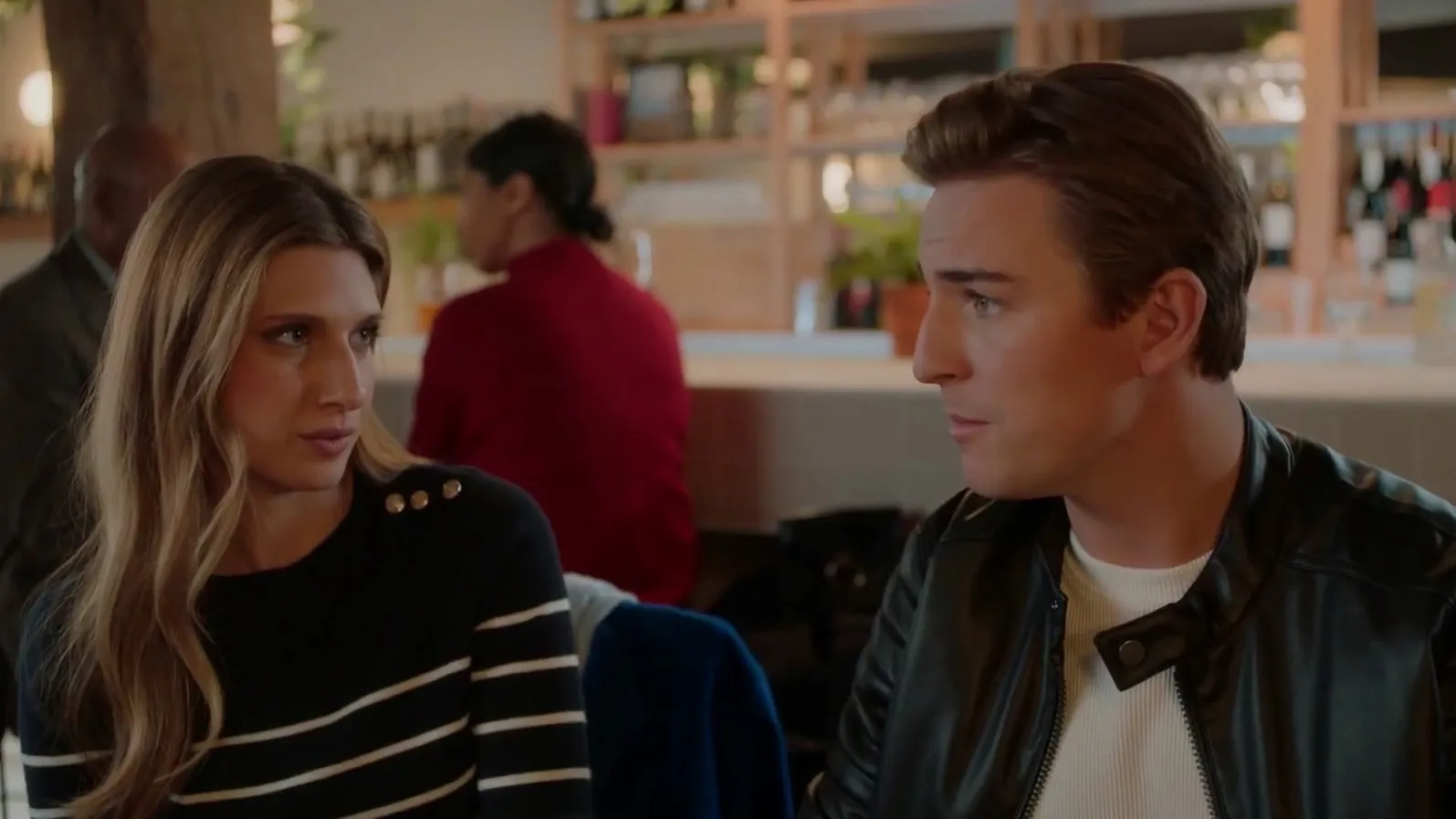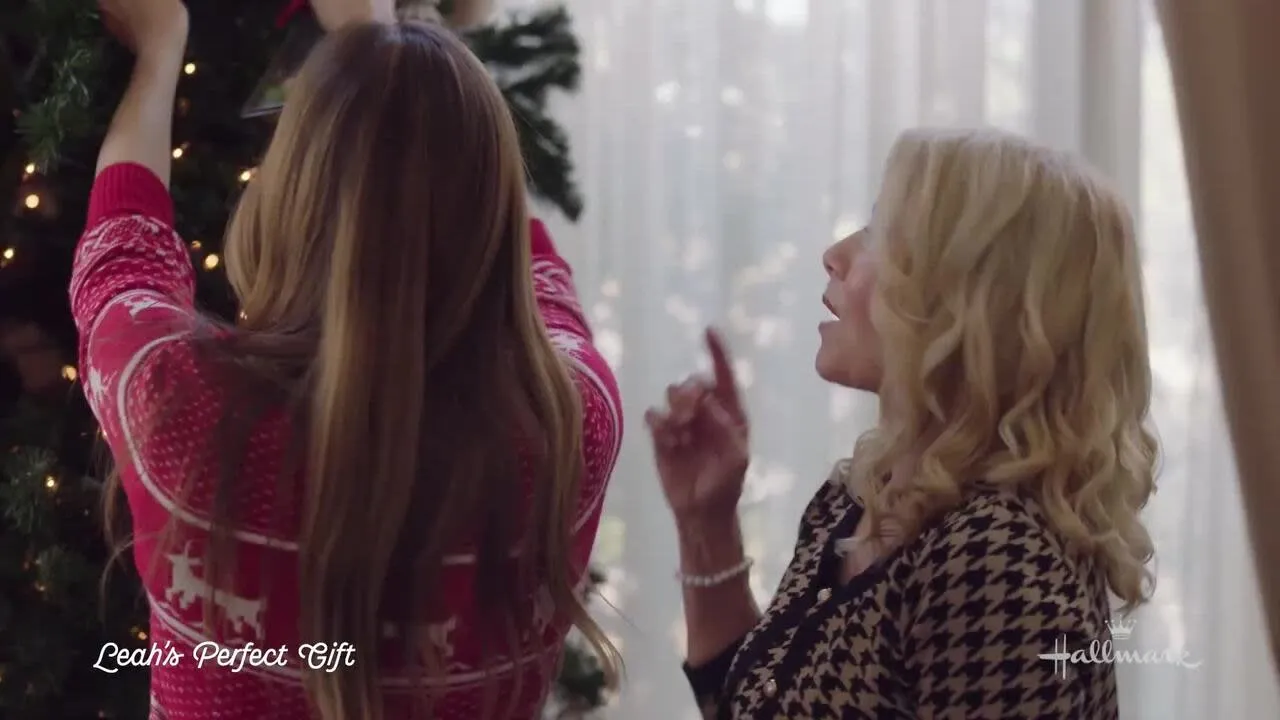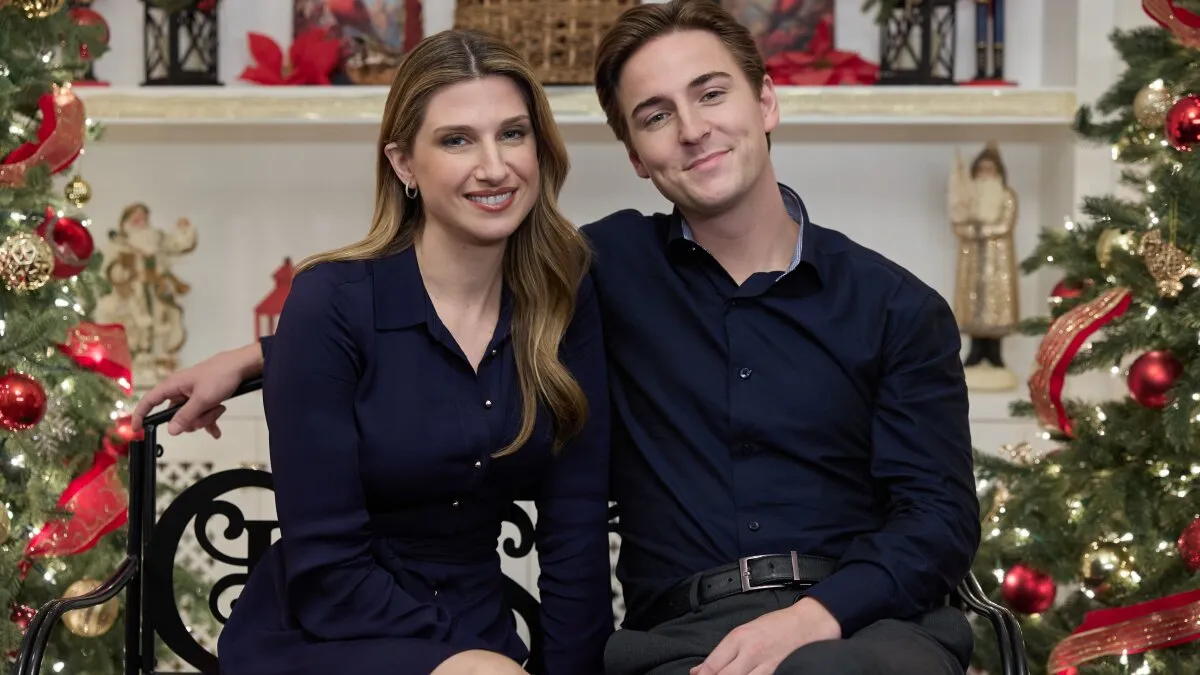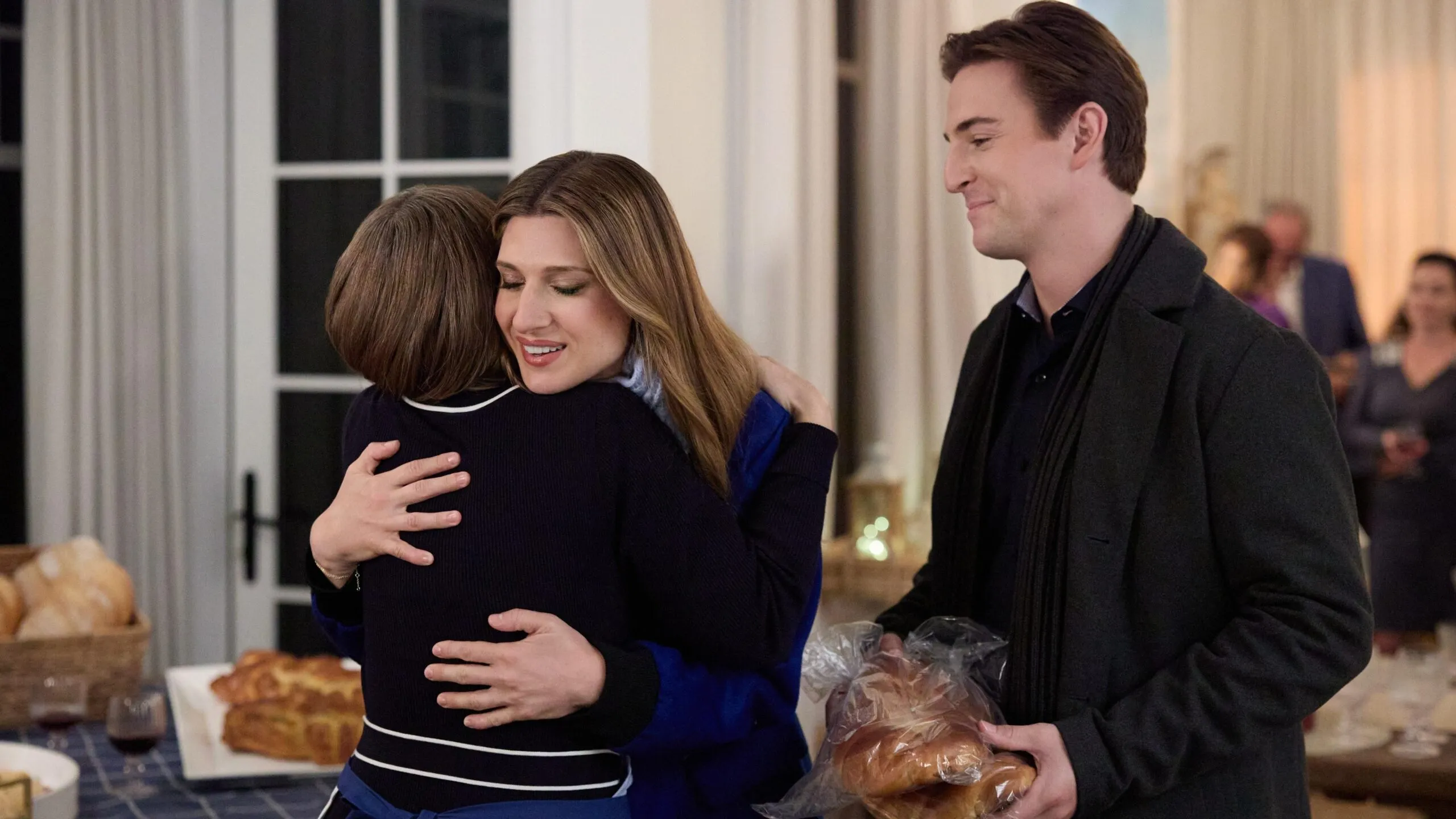In Leah’s Perfect Gift, we meet Leah Goldberg, a Jewish app developer in New York City whose narrative journey is a personal investigation and a cultural commentary. Emily Arlook, who plays Leah with warmth and authenticity, has been dating Christian software designer Graham Westwood for about a year.
The invitation to spend Christmas with his family is a watershed point in their relationship, a mix of hope and trepidation as Leah longs to embrace the holiday she has only seen from afar.
Leah’s excitement over this first Christmas is palpable. She gets into the holiday spirit, wearing an ugly sweater and researching rituals, embodying the stereotype of the eager outsider. However, the actuality of the event swiftly dampens her enthusiasm. When Leah meets Graham’s family, especially his intimidating mother, Barbara (Barbara Niven), the warmth she expected is replaced by a chilly welcome.
This tension is palpable, illustrating a clash of cultural identities that adds complexity to the narrative by adding a layer. The initial encounters highlight Leah’s vulnerability and criticize the frequently restrictive dynamics of family gatherings, especially when different backgrounds are involved. The film expertly sets the stage for a more in-depth examination of acceptance and the challenges of negotiating love across cultural boundaries.
Character Analysis
Leah Goldberg is the heart of Leah’s Perfect Gift, portrayed with nuance by Emily Arlook. As a Jewish app developer, she exudes drive and inventiveness, but her excitement about spending Christmas with Graham’s family betrays a deeper desire for connection and acceptance. Leah’s enthusiasm is tempered with concern; she wants to bridge the cultural divide between her heritage and her boyfriend’s family.
Her longing for inclusion is palpable, especially as she navigates Graham’s world. Her struggles with feelings of alienation become more apparent as she is confronted with Barbara’s coldness and the Westwood family’s subtle but pervasive expectations. Leah’s quest is more than just about enjoying a holiday; it’s a moving study of identity and belonging in a world where cultural differences can feel like insurmountable obstacles.
In this emotionally intense narrative, Graham, played by Evan Roderick, serves as Leah’s rock. He is shown as the supportive boyfriend, attempting to resolve the conflicts between Leah and his family. His role is particularly intriguing since it reflects a more contemporary take on romantic relationships in which partners handle familial expectations together.
Graham’s balancing act is admirable; he strives to preserve his mother’s customs while remaining attentive to Leah’s feelings. However, his dualism might occasionally make him look unaware of Leah’s emotional struggles. His intentions are laudable, but the film subtly challenges the notion that love alone can bridge enormous cultural barriers. As Graham grapples with the problem of being a bridge rather than a barrier, this complexity adds layers to his character, making him relatable but flawed.
Barbara, portrayed by Barbara Niven, is a strong presence in Leah’s journey. Initially, she appears to be the archetypal domineering mother, embodying old ideals that clash with Leah’s modern sensibilities. However, as the film unfolds, Barbara’s character undergoes an unexpected and thought-provoking shift. What begins as a rigid veneer gradually reveals deeper insecurities and fears about change and acceptance.
Her development serves as a commentary on generational tensions and the pressures of upholding cultural narratives. The tension between Barbara and Leah illustrates greater societal concerns about interfaith relationships, making Barbara’s final shift toward understanding all the more poignant. This narrative arc enhances Barbara’s character and encourages viewers to reflect on their familial dynamics and the complexities of love across cultures.
Themes
Leah’s Perfect Gift expertly navigates the complex terrain of cultural differences, especially through the lenses of Jewish and Christian traditions. The film juxtaposes Leah’s intense affection for Christmas—a holiday she has only experienced through movies and her imagination—with the grim reality of her first Christmas with Graham’s family.
This juxtaposition is more than just a backdrop; it also critically reflects how cultural narratives impact our expectations and experiences. Leah’s excitement is palpable but swiftly tempered by the unpleasant reality of her relationship with Graham’s mother, Barbara.
The film expertly employs holiday motifs to illustrate the contrast between Leah’s idyllic view of Christmas and the repressive traditions the Westwoods preserve. In a multicultural world where acceptance is frequently hard-won, this investigation resonates with greater societal trends, reflecting the complexities of interfaith relationships.
At its core, the film examines Leah’s search for acceptance within the Westwood family. As she grapples with feelings of alienation and the pressure to conform to a family structure that feels foreign to her, her journey is filled with challenges.
The narrative skillfully captures Leah’s internal struggles, illustrating the emotional toll of seeking to belong in a space that appears hostile to her existence. As she navigates awkward family relationships and Barbara’s expectations, Leah’s character serves as a vehicle for exploring the larger issue of assimilation into a distinct cultural family dynamic.
This issue is especially pertinent in today’s culture, as integrating disparate backgrounds often presents challenges. The film’s empathetic portrayal of Leah’s journey toward acceptance not only draws the audience into her world but also stimulates contemplation on our own relationships and how we might promote inclusion and understanding across cultural differences.
Performance Evaluation
Emily Arlook gives an outstanding portrayal of Leah, embodying the character’s complexities with charm and vulnerability. Her performance reflects a complex emotional spectrum, allowing audiences to empathize with Leah’s journey of self-discovery and acceptance. Arlook expertly navigates Leah’s excitement, worry, and, ultimately, strength as she faces the challenges of integrating into Graham’s family.
During the Westwood family’s holiday rituals, Leah grapples with her feelings of solitude, and there are some truly moving moments. Arlook’s ability to depict Leah’s psychological struggles makes her a relatable and sympathetic protagonist, effectively transporting the audience into her inner environment.
Evan Roderick’s performance as Graham complements Arlook nicely, establishing a balance between a supportive companion and an imperfect individual. His acting captures the essence of a modern boyfriend torn between his family’s expectations and his love for Leah.
Roderick has a natural chemistry with Arlook, which enhances the authenticity of their relationship. He gives Graham a nuanced dimension, conveying his real compassion for Leah but also emphasizing his occasional indifference to her struggles. This dynamic adds layers to the narrative, making their interactions compelling and relatable.
The supporting cast, particularly Barbara Niven as the formidable Barbara Westwood, contributes to the film’s emotional weave. Niven’s acting is a masterclass in nuance; she captures the complexities of a mother who is both protective and steadfastly traditional. Her initial coldness towards Leah generates palpable tension, critical to the film’s conflict.
As the story progresses, Niven navigates Barbara’s character development expertly, exposing deeper depths that encourage thought on familial love and acceptance. The ensemble cast, which includes Graham’s sister and father, adds depth, resulting in a well-rounded representation of a family dealing with change and the challenges of embracing diversity. Each performance adds to a complex tapestry that resonates with the film’s major themes.
Humor and Dialogue
Leah’s Perfect Gift contains speech that reflects the film’s cheerful tone and emphasizes its deeper issues. One memorable moment occurs when Leah, attempting to traverse the complexities of holiday traditions, says, “You know it’s funny, Ebenezer Scrooge always makes goose sound like it would be so rich and delicious, but it’s quite lean, with its distinct odour.”
As Leah grapples with the Westwood family’s expectations, this line captures her combination of humour and innocence. Such memorable statements captivate viewers, providing insight into Leah’s character while eliciting genuine, rather than forced, laughing.
The film uses humour to navigate cultural differences and family issues, injecting levity among the more emotional themes of acceptance and belonging. The contrasting dynamics between Leah and Barbara are frequently highlighted via amusing exchanges that expose their generational and cultural differences.
Rather than depending on cheap punchlines, the humour is rooted in character development, allowing spectators to empathize with the awkwardness of meeting the in-laws and the pressure of combining cultures. This style is reminiscent of the best works of filmmakers like Noah Baumbach, who brilliantly mix humour and emotional depth. Leah’s Perfect Gift uses humour as a lens to analyze familial relationships, which entertains and inspires reflection on how laughing may relieve tension in our lives, especially when dealing with the complexities of cultural differences.
Cinematography and Setting
Leah’s Perfect Gift dazzles the senses with bright cinematography that captures the joyous spirit of the holiday season. The film uses a warm colour palette, with deep reds, greens, and golds, to evoke the cosiness of family reunions and the excitement of Christmas.
The cinematography, with a careful eye for detail, beautifully contrasts the surroundings of Leah’s vibrant Jewish home and the more somber, traditional Westwood home. This visual contrast not only enhances the emotional landscapes of the characters but also serves as a visual metaphor for the cultural clash at the heart of the story. Each shot is carefully crafted, reflecting a polished yet approachable style reminiscent of classic holiday films while integrating a contemporary flair to keep it new.
The Christmas backdrop is more than just a festive setting; it plays an important role in defining the narrative and the characters’ experiences. As Leah navigates the complexities of her first Christmas with Graham’s family, the holiday decorations—twinkling lights, gingerbread houses, and snowy landscapes—amplify her excitement and trepidation.
The décor develops into a character in and of itself, embodying the warmth and pressures of family customs. This location enhances the storyline by placing Leah’s journey within a familiar cultural framework, allowing spectators to connect with her struggles on a deeper level.
The film successfully leverages the holiday mood to represent the larger issues of acceptance and belonging, illustrating how the cheerful surface can often conceal the complexities of familial interactions. It’s a brilliant interplay that resonates with everyone who has experienced the bittersweet aspect of holiday parties, reminiscent of how the best works of contemporary film-makers like Greta Gerwig portray the intricacies of human relationships against festive backdrops.
Overall Impression
Leah’s Perfect Gift examines character dynamics and cultural representation, providing a novel perspective on the holiday rom-com genre. The film’s strength is its ability to genuinely depict the merging of Jewish and Christian traditions, making it appropriate for our increasingly heterogeneous society.
Leah and Graham’s relationship serves as a microcosm of larger cultural upheavals, encouraging audience members to deal with topics of acceptance and identity. Emily Arlook’s performance as Leah gives her character a relatable dimension, and Evan Roderick’s portrayal of Graham provides a nuanced layer of genuine support. The film expertly combines humour with emotional poignancy, allowing audiences to follow Leah’s journey as she navigates the complexities of family dynamics over the holidays.
However, Leah’s Perfect Gift has major pacing flaws, especially in the second half. The narrative hurries to resolutions that, while joyful, might feel forced, diminishing the emotional weight of Leah’s struggles. Furthermore, secondary characters, such as Graham’s sister and father, are underdeveloped, making their arcs fairly superficial. A deeper look at these relationships could boost the film’s impact and add to a fuller tapestry of family dynamics.
Despite its flaws, Leah’s Perfect Gift is an entertaining and fascinating film that resonates with today’s ageing audience. It captures the essence of holiday gatherings—the joy, the tension, and the hope for acceptance—while telling a story that is both familiar and unique. This film is a tribute to the changing environment of holiday movies, where varied tales are accepted and celebrated.
As someone who enjoys the intricate narratives of filmmakers like Greta Gerwig and the emotional resonance of traditional holiday films, I thought Leah’s Perfect Gift was a beautiful addition to the seasonal roster. It prompts viewers to reflect on their own experiences of love and belonging.
The Review
Leah's Perfect Gift
Leah's Perfect Gift is a lovely holiday romantic comedy that delicately examines the convergence of Jewish and Christian traditions through the perspective of a relatable protagonist. While it balances humour and emotional depth well, pace flaws and undeveloped supporting characters detract from the overall impact. Nonetheless, the film's warmth and cultural representation make it an enjoyable watch this season.
PROS
- Heartfelt exploration of cultural diversity.
- Strong lead performances, particularly by Emily Arlook.
- Effective blend of humor and emotional moments.
- Relatable themes of acceptance and belonging.
CONS
- Pacing issues in the latter half of the film.
- Some supporting characters are underdeveloped.
- Resolutions can feel rushed and unearned.





















































